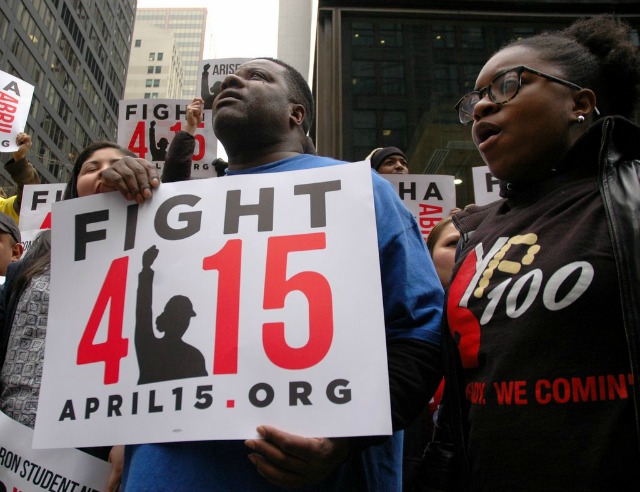Fight For 15 Expands Movement Ahead Of International Strike
By aaroncynic in News on Mar 31, 2015 9:30PM

(Fight for 15 supporters outside of McDonald's at 23 N. Clark St., the site of multiple fast food worker rallies./ Photo: Aaron Cynic/Chicagoist)
Chicago workers from a variety of sectors, community activists and others say they plan to participate in what organizers are saying could be the largest-ever international strike for low wage workers. Spurred by the “Fight for 15” movement, home-care workers, adjunct university professors, cab drivers, Walmart workers, students and others say they’ll join with fast-food and retail workers on April 15 to demand $15 an hour and the right to unionize.
“In order for us to uplift our communities and our families, we must be paid $15 an hour and (given) the right to form a union,” said Douglas Hunter, a McDonald’s employee, at a press conference outside the chain’s location on Clark and Monroe in the loop. “These are things we need now. We cannot wait till 2019. We will not wait till 2022. ComEd isn’t waiting. Peoples Gas isn’t waiting. We need wages that support ourselves.”
Organizers say that the movement, which began in 2012 with small job walk-offs by fast food workers and spread on a national and international scale, intersects with industries globally and has become an integral part of social justice. “This fight is about racial justice and economic justice. Racial justice is economic justice," said Charlene Carruthers, national director of the group BYP 100. “When we say black lives matter, that includes black workers. As young black people, we know that when we are engaged in collective bargaining and action... justice is going to happen.”
Last year, the City Council passed an ordinance requiring a gradual increase in Chicago’s minimum wage to $13 an hour by 2019. Lawmakers in Springfield have been working to increase the state wage, with a House bill that kicks it up to $10 an hour by 2016 and a Senate bill that provides incremental increases to $11 an hour by 2019. Governor Rauner has said he’d consider an increase, but prefers an even slower pace to $10 an hour by 2022.
For Hunter and others, none of these measures are enough. “Prices are constantly going up. Our rent is going up every year. Our food costs are going up every year. And we’re asked to wait until 2019 to get to $13 or 2022 to get to $10. This is unacceptable.”
On a broader scale, the countless actions in individual cities and networked strikes worldwide have helped make the call for better wages and unions for minimum and low wage workers one that has had an impact. The National Labor Relations board began hearings yesterday to determine whether or not the McDonald’s corporation shares responsibility for the actions of its franchisees when worker's rights are violated. Workers in 19 cities also filed complaints with the company two weeks ago alleging a lack of protective equipment caused burns on the job. In November, San Francisco became the third largest U.S. city to adopt a $15 an hour minimum wage.
Matt Hoffman, an adjunct professor at Loyola, said at the press conference today that the fight for better wages for workers extends to his profession. "Right now there’s a crisis in higher education,” said Hoffman, who added that he “pieces together a living” working at different universities. “Teaching at a college itself is increasingly becoming a part time job. Almost 1/3rd of part timers live near or below the poverty line.”
Home care workers are some of the lowest paid in the country, with some making as little as $13,000 a year and many relying on public assistance to supplement their income. Lynette Newman, a home care worker who cares for a person with a disability said she was “sick and tired of being sick and tired.” “At first, it may not sound like we all have anything in common,” said Newman. “The bottom line is we all get up each and every day, work hard and bring home a paycheck that does not support our families.”
The day of demonstrations, which are planned for April 15 to take place in some 200 U.S. cities and as many as 40 different countries, will culminate in Chicago at a large rally at at UIC's student center in the afternoon.